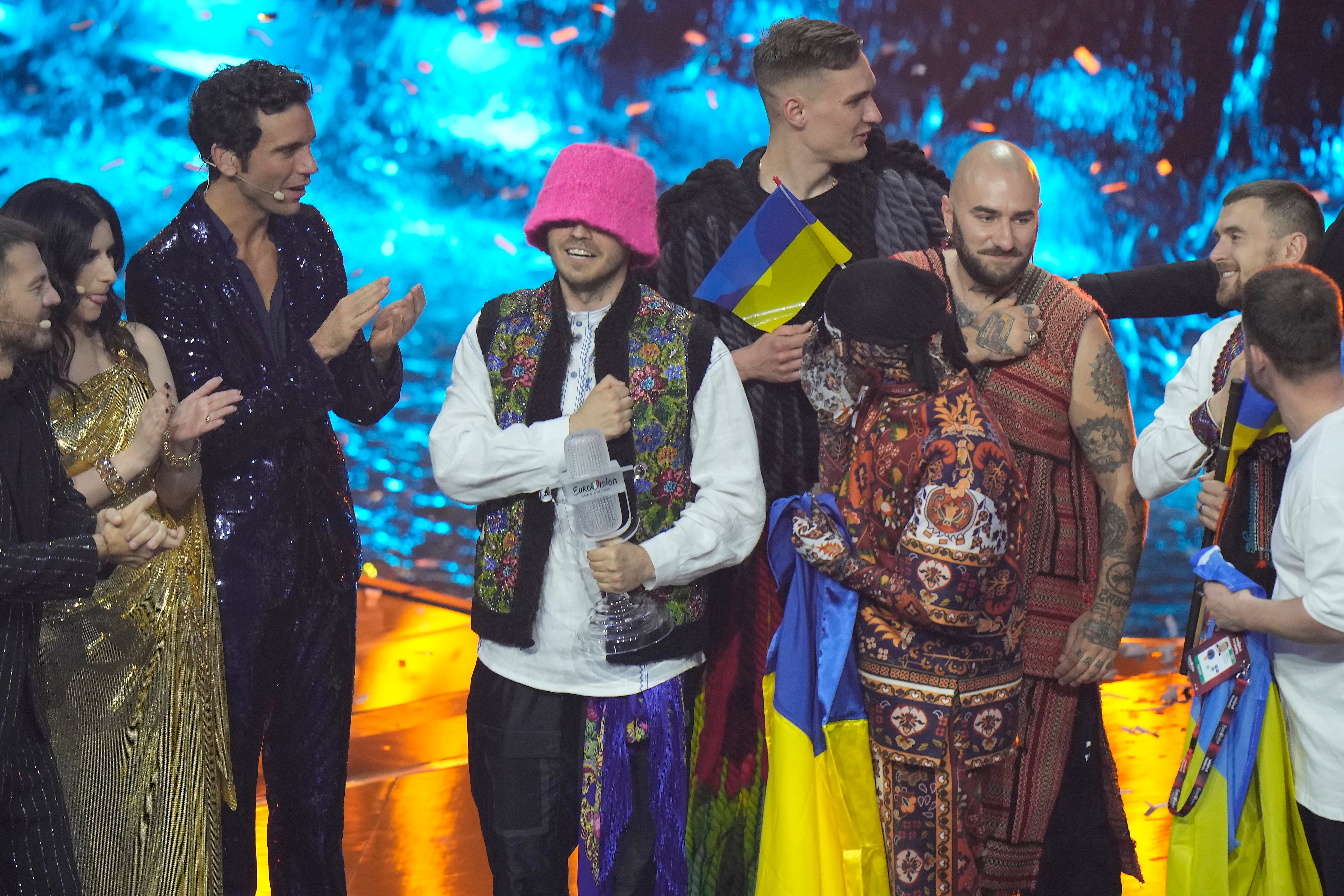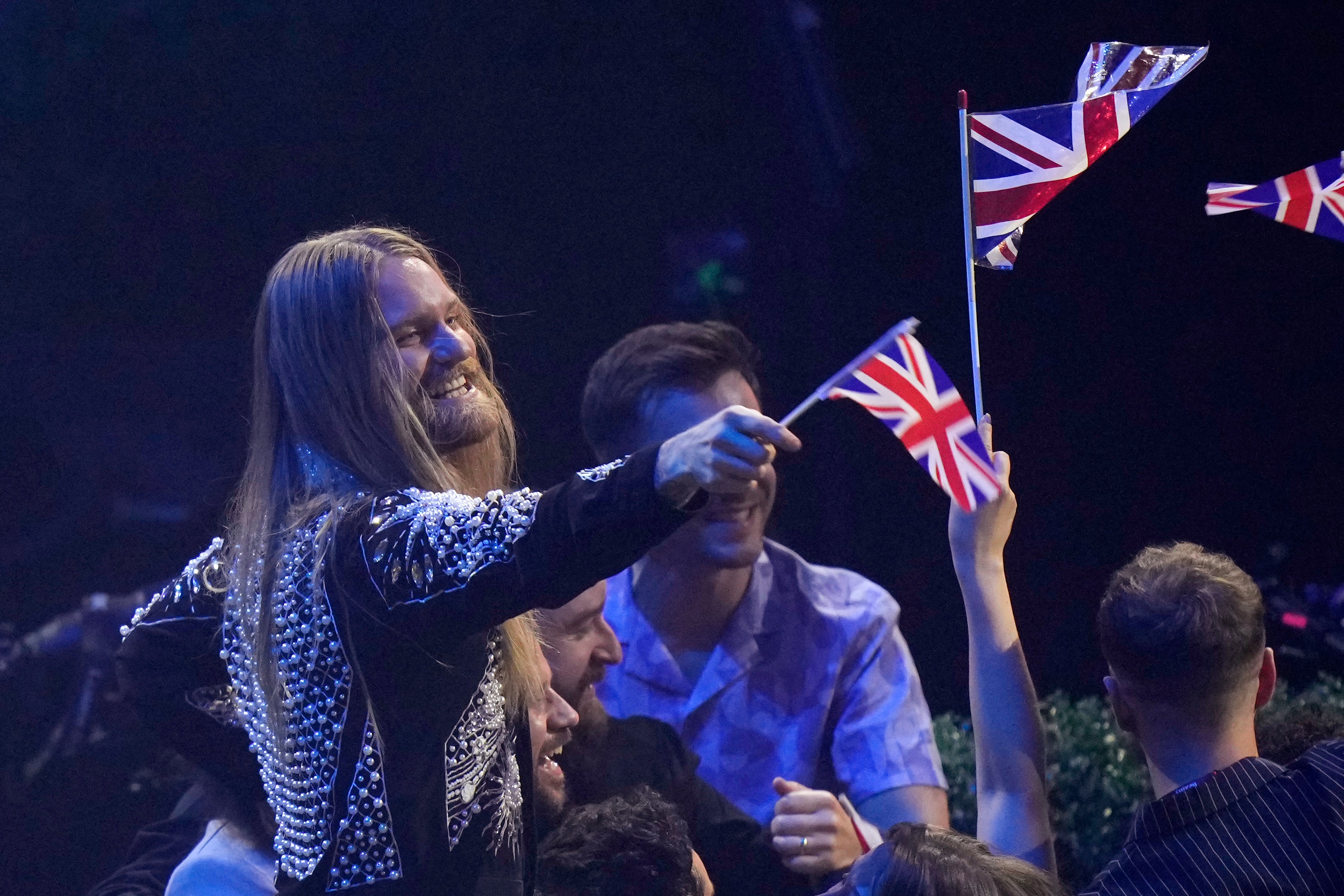Ukraine’s Kalush Orchestra win Eurovision 2022 in an emotional, compassionate final
Hip-hop collective Kalush Orchestra took the crown after a tense and emotional final that saw the UK’s Sam Ryder finish a very respectable second place. Roisin O’Connor reports from Turin, Italy


Your support helps us to tell the story
This election is still a dead heat, according to most polls. In a fight with such wafer-thin margins, we need reporters on the ground talking to the people Trump and Harris are courting. Your support allows us to keep sending journalists to the story.
The Independent is trusted by 27 million Americans from across the entire political spectrum every month. Unlike many other quality news outlets, we choose not to lock you out of our reporting and analysis with paywalls. But quality journalism must still be paid for.
Help us keep bring these critical stories to light. Your support makes all the difference.
“Everybody wants peace. And music is peace.” Words uttered by Eurovision 2022 host Laura Pausini summed up one of the most emotional song contests in recent memory, with hip-hop collective Kalush Orchestra taking first place after a dramatic finale.
This year’s Eurovision Song Contest was one of the most intriguing, exciting and unpredictable in years. While there were grumbles behind the scenes about the levels of organisation from the 2022 host country, Italy, the show itself was as spectacular as ever – perhaps even more so thanks to dynamic presenters Pausini, Alessandro Cattelan, and Lebanese-born British pop star Mika. Pausini, one of Italy’s most adored and prolific pop artists, performed a spectacular medley of her greatest hits along with a rendition of that Italian classic, “Volare” by Domenico Modugno.
It was also the UK’s best performance in years. For only the third time this century, a UK contestant made it to the top 10 of the Eurovision final. That contestant was Sam Ryder, the endearing, bearded singer-songwriter originally known for his viral Tik-Tok renditions. Yet it was the 32-year-old’s background performing in rock and metal bands that seemed to benefit his rousing rendition of pop ballad “Space Man”. Resplendent in a silver space suit and surrounded by a glowing metal cage, Ryder nodded to British heritage acts such as Elton John and David Bowie. His voice – pitched at a dizzying falsetto reaching celestial highs – soared despite what was unquestionably a lot of pressure from a nation that came dead last in 2021.
There was plenty of competition for Ryder, too. Ukraine came out swinging with their eclectic hip-hop troupe Kalush Orchestra, while Italy got hearts fluttering with Mahmood and Blanco’s poignant ballad “Brividi”, and Spain got, erm, something else going with Chanel’s sizzling pop song “Slomo”. There were eclectic offerings from Norway (“Give That Wolf a Banana”) and Moldova (“Trenulețul”). And there was the downright peculiar, in the form of Serbian artist Konstrakta singing “In Corpore Sano” (“a healthy body”). It was a work of performance art featuring a wash basin, hand gestures, and ominous, cloaked figures handing the singer towels.
Kalush Orchestra dispelled any assumptions that they’d cruise through the contest on sympathy votes alone. The Ukraine group’s performance was sharp and energetic, paying tribute to their heritage while incorporating modern rap elements. Shortly after Moldova’s lively performance, which sent a conga line dancing around the press room here in Turin, it was Ryder’s time to shine. The response to his song was notably more enthusiastic than poor James Newman with last year’s dismal effort, “Embers”. It helped that Ryder was so endearing during his campaign and at the rehearsals in Turin, taking care to remember the name of each journalist who interviewed him. “[I’m doing this for] the love of singing and songwriting, and of being a fan of Eurovision in general,” he’d told The Independent just a week before the final. “The scoreboard needs to be an afterthought and the focus just on the song and enjoying the whole experience!”

Last year’s champions Maneskin turned up to bring some fire to an already lively contest. Damiano David put a brave face on what looked like a nasty ankle injury (he’d turned up to the show using a crutch), then cracked a joke about the band’s notorious “coke” scandal last year, where a brief shot of him leaning down to pick up some broken glass was misconstrued by viewers. Any advice for this year’s 25 contestants, he was asked? “Don’t get too close to the table.” Mika followed with a glittering mash-up of some of his biggest hits, including “Happy Ending” and “Love Today”.
Those performances were distractions, of course, as members of the public in Europe and Australia, along with each country’s panel of judges, took to voting for their favourite contestants. What followed was something we hadn’t seen in years. Douze points for the UK, from Ukraine, then Germany, then Belgium, then France. And the points just kept coming. By the time each participating country had read out its jury’s scores, the UK was at the top of the leaderboard in what felt like the first time in aeons. But as fans will know, the public vote can change everything.
The UK second, helped by Ukraine with those douze points. But Kalush Orchestra had a comfortable finish with a massive total of 631 points. “You have melted our hearts, friends [at] Eurovision,” the embattled country’s government account tweeted. “And it matters the world to us during this time. We send all your love and support to our brave freedom defenders at Azovstal and along the frontline. Congrats, KALUSH Orchestra.” And really, who deserved it more?
Join our commenting forum
Join thought-provoking conversations, follow other Independent readers and see their replies
Comments